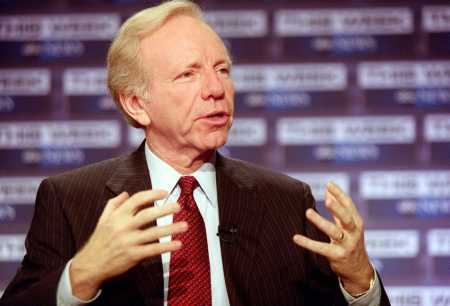GO TO THE PRINCIPLES, OFFICE?
A few days ago, Matt Yglesias made the point that all the talk about how principled Joe Lieberman's hawkish votes have been should make us think less of principled votes qua principled votes rather than more of Joe Lieberman. Ben Adler, echoing Matt's point that how elected officials vote should concern us more than why they do, questioned why Matt sees people who call for censorship in order to get votes as any less blameworthy than the ones who call for censorship on principle. The right, incidentally, deploys both the "Don't worry, he doesn't believe it" and "But those are his principles" arguments to great effect to shield its politicians from criticism, depending on which one fits best at the time. The best contemporary examples come to mind around gay rights. Every time a current or historical anecdote emerges about George W. Bush being personally other than hostile towards someone he knows is gay, Bush apologists seize on the story as proof that imputing intolerance to the man just because he pushes policies that make gay folks second-class citizens is the real intolerance. Meanwhile, when Republican judicial nominees are questioned about their records on protecting the rights of gay folks, conservatives pillory the questioners for trying to punish their principles - and being "anti-Catholic" to boot. Matt responded to Ben that the politicians who hold bad positions on principle are more likely to push them forward in political discourse rather than simply voting for them. Call me cynical (and I'm younger than either of them), but while it's probably the case all things being equal that politicians devote more energy to the positions closest to their hearts, all things tend not to be equal, and there are a fair number of examples out there of politicians taking stances that seem to have more to do with their sense of political reality than their sense of ethical imperative and then do whatever they can to highlight those issues and those positions. But testing that hypothesis would require devoting more energy to divining the secret motivations of our elected officials, which only reinforces the narrative of political change as personal psychodrama rather than clash of collective actors. It reinforces the "Great (Elected) Man" theory of history to which too many progressives fall prey, in which progress comes from getting the right visionary leader into office and then keeping him there. Speculating about what Bill Clinton really thought of throwing moms in vocational training off of welfare or denying full faith and credit to same-sex couples makes for good copy and good conversation. But we're both better equipped and more responsible to consider whether he was right to make those moves, and under what structural circumstances they might not have been as appealing. Of course when elected officials do the right thing I'd rather think that they believe in it too (if a politician also, say, calls for an end to poverty in hopes of getting elected President, then that sure beats executing a mentally disabled man in order to get elected President). But I'll choose which Senators to vote for based on how they'll vote, how they'll shift which issues capture political discourse and what the margins of that discourse are, and how they'll affect the partisan breakdown of the body. That said, Lieberman's people know what they're doing with their appeal to "principle": Voters tend to prefer candidates they perceive as acting from principle (Paul Waldman has a great discussion of this in his aptly titled book Being Right Is Not Enough). Hence the quarter of 2004 Bush voters in Wisconsin who also voted for Russ Feingold. Those amongst our elected officials with left opinions that dare not speak their names would do well to keep that in mind.




0 Comments:
Post a Comment
<< Home